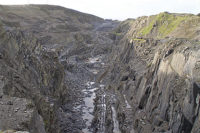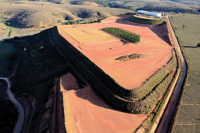
The members of the Artisan Group have enacted a range
of eco-friendly initiatives at their facilities. At Fine Line Pacific of Kent,
WA, the company’s commitment to the green movement is not only reflected in its
shop, but also in its offices.
As a national organization of independent granite fabricators, the members of the Artisan Group have made an effort to share “best practices” with their fellow members. Among them, many of these member shops have developed eco-friendly practices in their shops and in their use of scrap/waste material. The following is a look at some of the initiatives taking place.
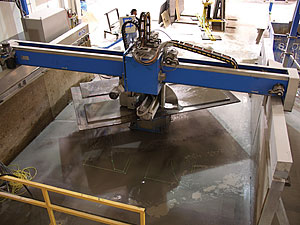
Within Fine Line Pacific’s fabrication operations,
which includes large-volume facilities, 100 percent of the water used is recycled.
Moreover, 100 percent of the company’s stone waste is recycled.
Fine Line Pacific, Kent, WA
At Fine Line Pacific, the company’s commitment to the green movement is not only reflected in its shop, but also in its offices. In the company’s fabrication operations, which includes large-volume facilities, 100 percent of the water used is recycled. Moreover, 100 percent of the company’s stone waste is recycled.To generate as much life out of its diamond-metal tooling as possible, these items are re-calibrated rather than discarded. Additionally, 100 percent of the cardboard used to template jobs is recycled.
In the offices, all computer equipment and batteries are recycled after use, and general office waste (paper, plastics, ink cartridges, etc.) is also sent for recycling. “Whenever possible, collateral and sales materials are printed on Forest Stewardship Council (FSC) certified paper,” said Mike Birdwell, Vice President of Sales & Marketing for Fine Line Pacific.
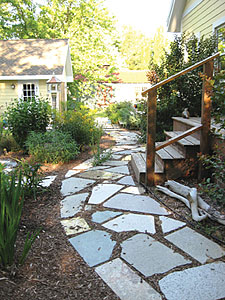
Scrap recycling is a practice at the shops of many
Artisan Group members, such as SolidTops of Easton, MD.
FloForm Countertops, Winnipeg, MB, Canada
FloForm Countertops has recently upgraded its water treatment/water recycling system, implementing a pre-filter set up that filters the water before it even enters the filter press. “This has enabled FloForm to recycle close to 100 percent of its water, although some is always lost from natural attrition, evaporation, etc.,” explained Ted Sherritt, President and CEO of FloForm. “We now have gray water for our cooling halos and saws, white water for the backsplash machine and clear water for the waterjet. The scrap recycler even takes the sludge left over from its water recycling.”Additionally, FloForm is sending most of its ADI CNC tooling for regrinding, getting an extra 50 percent life out of them. “This recycling is all a double benefit,” Sherritt said. “It benefits our bottom line as we get extra life out of our tools and use less water. It also keeps a lot of junk out of the landfills and helps us do our part for the future.”
FloForm countertops takes all of its scrap granite (approximately 3,000 to 4,000 pounds per day) to a recycler, which has a gravel crushing plant and an excavating business. “Our scrap granite is crushed along with recycled concrete, and he then uses this gravel in his excavating business,” Sherritt said. “In November of 2009, we had a fire in one of our buildings. This has led us to putting a 7,000-square-foot addition on to one of our other buildings, and this addition involved a lot of excavation work. This included re-leveling the yard, gravel base for concrete foundation and a new gravel staff parking lot. The contractor that will be doing this excavating is the same firm that FloForm has been using to recycle their scraps. So in a weird twist of fate, the granite scraps will be coming home.”
Scrap recycling is also a practice at other Artisan Group members, such as SolidTops of Easton, MD, and Rocksolid Stoneworks of Cleveland, OH. “We recycle all our waste with a rock crushing company that uses the end product for fill and road building,” said Evan Kruger, owner of SolidTops. “Before our scraps are picked up by the crushing company, my customers sometimes pick through the off-fall.”
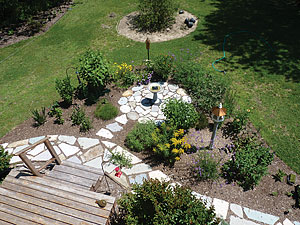
Among the uses of scrap stone from SolidTops of
Easton, MD, are landscape applications.
Rocky Mountain Stone, Albuquerque, NM
Rocky Mountain Stone was started in 1963 as a supplier of natural building and landscaping stone for the Albuquerque area. Since then, the company has expanded into every aspect of the natural stone industry, and it continues to be a progressive leader in stone fabrication. Among the company’s eco-friendly practices, it has made water recycling a priority in the shop. “All the water used in our production facility is run through a filtering system to remove waste particles and is returned to the tank to be used again, with 100 percent efficiency,” said Scott Lardner, President of Rocky Mountain Stone.The company has also developed an innovative process for turning its scrap stone into a new, viable finished product. “With the waste we create from cutting custom granite kitchen countertops, we created a unique new product to use as paving stones,” Lardner said. “From a designer’s perspective, we’ve created the modern look of cobblestone; a collage of color and texture. From an environmentalist’s perspective, we have the ultimate green paver. We make this brand new product at our fabrication shop here in Albuquerque from 100 percent recycled materials. They are available in four different shapes: 4- x 8-inch rectangles, 6-inch hexagons, 4-inch scallops and 4-inch diamonds; colors are variable. After being stamped on a machine, they are tumbled to add texture and slip resistance to the polished face.
“Since each kitchen is a mixture of unique shapes and sizes, there is inevitably about 30 percent waste out of each slab we cut,” Lardner continued. “The larger end cuts are saved in our bone-yard. Consumers have an opportunity here to purchase vanities, fireplace hearths, and other small projects at discounted prices. But there has always been a varying line drawn that separates an ‘end cut’ or ‘remnant’ from waste. The waste that was left over used to be saved in another pile at the far end of our yard, and there were stacks and stacks of granite. We try to sell these to our landscaping customers, encouraged by the ‘trash-to-treasure’ theory. The truth is, though, that these unevenly sized and unfinished pieces of granite and marble are difficult for even the most creative DIYer to use. And so, our stacks grew higher and multiplied. Something had to be done. This is where the idea of a stone stamper was born. We turned our stacks of leftover granite into a unique, attractive, and very durable landscaping product.”
Being in a desert environment, Rocky Mountain Stone also takes measures to educate the public about the benefits of Xeriscaping - landscaping and gardening in ways that reduce or eliminate the need for supplemental water from irrigation. Valuable tips on how to save water in the high desert of New Mexico are available in the company’s Yard Sales office.
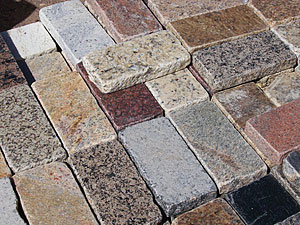
“With the waste we create from cutting custom granite
kitchen countertops, we created a unique new product to use as paving stones,”
explained Scott Lardner of Rocky Mountain Stone. “From a designer’s
perspective, we’ve created the modern look of cobblestone; a collage of color
and texture. From an environmentalist’s perspective, we have the ultimate green
paver. We make this brand new product at our fabrication shop here in Albuquerque from 100 percent recycled materials.”
Habitat ReStores are outlets that accept donated goods for resale. ReStore focuses on home improvement goods such as furniture, home accessories, building materials and appliances. These donated goods are sold to the general public at a fraction of the retail price to help local affiliates fund the construction of Habitat homes.
Materials sold by Habitat ReStores are donated by local retailers, contractors and individuals in the community. ReStores provide an environmentally and socially responsible way to keep good, reusable materials out of the waste stream and while simultaneously providing funding for all of Habitat’s community improvement work.
Habitat for Humanity is a nonprofit, ecumenical Christian housing ministry. It seeks to “eliminate poverty housing and homelessness from the world and to make decent shelter a matter of conscience and action.” To accomplish these goals, they invite people of all backgrounds, races and religions to build houses together in partnership with families in need. Through the work of Habitat, thousands of low-income families have found new hope in the form of affordable housing. Churches, community groups and others have joined together to successfully tackle a significant social problem: decent housing for all. Today, Habitat for Humanity has built more than 300,000 houses, sheltering more than 1.5 million people in more than 3,000 communities worldwide.
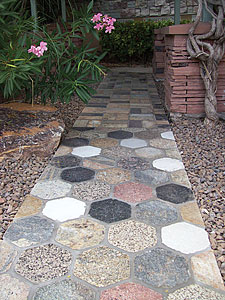
The pavers created by Rocky Mountain Stone can be
finished into a variety of shapes.
Accent Surfaces, Salt Lake City, UT
A range of remnant recycling programs are in place at Accent Surfaces. Large remnants and countertops are donated to Habitat for Humanity, while others are liquidated to benefit the company’s employee-nominated charities. These include Autism Speaks, the Muscular Dystrophy Association, the National Kidney Foundation, the National Multiple Sclerosis Society and the National Fibromyalgia Association. “Each of these charities holds a special place in the hearts of one or more of our employees, thus making them extremely important to Accent Surfaces,” said Larry Hamilton, Company President. “Smaller remnants are donated to a local company who, in their green efforts, utilizes the pieces to produce landscaping rocks and pavers.”In the shop, Accent Surfaces points out that its investments in technology not only add efficiency, but they elevate the company’s eco-friendly practices. “We have brought to our production shop a new SawJet that will help us eliminate waste in product, time and production space,” Hamilton said. “Accent Surfaces recycles the water we use during our production process through our high-tech water purification and recycling systems in order to minimize our water consumption. For our office, we have developed a Paperless Order System that will eliminate a huge portion of our paper usage as well as file folders, ink cartridges, filing cabinets and other office supplies.”
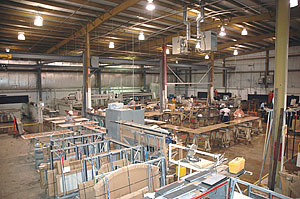
Innovative Surfaces of Hastings, MN, recently made the
conscious decision to convert its water reclamation system in its stone
fabrication facility into a 100% recycled system. “Virtually all of the water
used in the stone fabrication process is reclaimed and run through a filtration
system for re-use over and over again,” explained Bruce Akins, President of
Innovative Surfaces.
Innovative Surfaces Inc., Hastings, MN
Innovative Surfaces’ appreciation for the critically important green movement is reflected not only in the products they offer, but in their services as well.Innovative recently made the conscious decision to convert its water reclamation system in its stone fabrication facility into a 100 percent recycled system. “Virtually all of the water used in the stone fabrication process is reclaimed and run through a filtration system for re-use over and over again,” explained Bruce Akins, President of Innovative Surfaces. Another green effort undertaken in the stoneworking facility is its recycling program for 100 percent of its natural stone scrap. All of the scrap is recycled to be ground into gravel for use in various outdoor applications.
Recycling of scrap material is nothing new at Innovative’s Solid Surface shop. Innovative has historically reclaimed approximately 80 percent of its Solid Surface scrap for re-use, and continually challenges itself to find ways to increase this recycled percentage. Innovative’s most visible commitment to the green movement is reflected in its wide palette of green products offered. Innovative offers a palette of post-consumer content surfacing products - ranging from solid surface to cellulose to concrete to repurposed glass. Included in its product line is a palette of Greenguard-certified surfacing products.
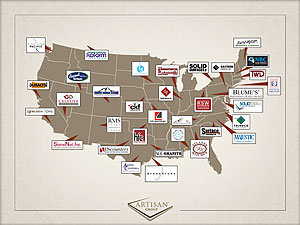
With 35 members and growing, Artisan Group covers most
major markets in the U.S. and Canada.
AG&M, Austin, TX, Nashville, TN, and San Antonio, TX
When AG&M built its new campus in Austin, it implemented a number of environmentally friendly practices:1. Replaced forklifts with overhead cranes that consume electricity instead of diesel.
2. Set up a system to collect rainwater from the warehouse building roof, with the water being used for irrigation.
3. Paved all of its parking spaces with pervious concrete pavers to prevent runoff.
In the company’s Nashville and San Antonio facilities, the company built new indoor warehouses and replaced forklifts with overhead cranes. “The impact of replacing forklifts with cranes is huge for our company and for the reduction in carbon emissions,” said Company President Jack Seiders.
About the Artisan Group
With 35 members and growing, Artisan Group covers most major markets in the U.S. and Canada, and it can handle a variety of fabrication needs from a local to national scale. Its members average more than 20 years of fabrication experience in the countertop industry, and all Artisan Group members have achieved, or have begun the process to achieve, full accreditation with the Marble Institute of America. The group is among the first granite fabricators in the world to be working towards this distinction. Collectively, Artisan Group surpassed $350 million in sales in 2009.Brands of the Artisan Stone Collection include Exotic & Classic Granite, Modesto Granite (starting at $35/square foot) and Saratoga Soapstone. It also offers a marble collection as well as Heritage Wood surfacing products. Apart from countertops, the Artisan Group supplies the Firstline collection of granite care products as well as Kohler sinks and faucets through an exclusive specialty dealer program with the Kohler Company.
For more information, visit www.artisan-counters.com.
